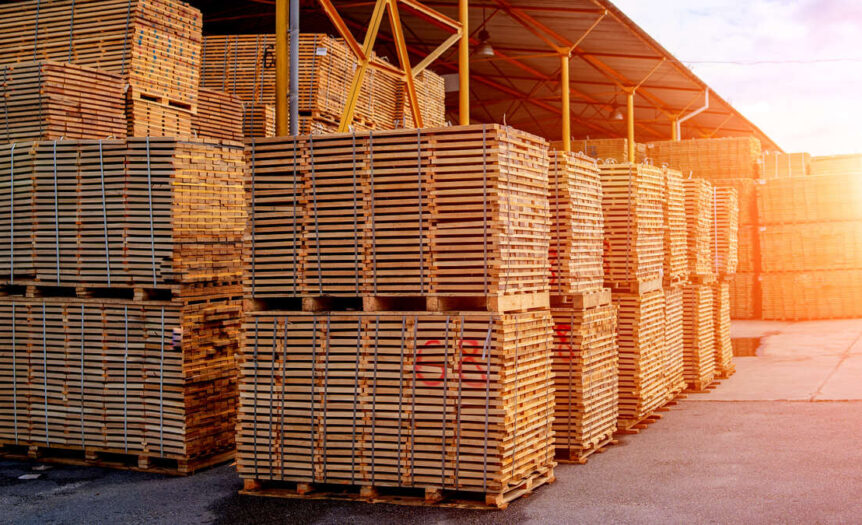Pallets play an essential role in industries around the world. These simple, flat structures make transporting, storing, and organizing goods more efficient. Pallets are indispensable, from keeping products safe during shipping to streamlining warehouse operations. Let’s take a closer look at how different industries shape the demand for pallets.
Food and Beverage Industry
The food and beverage sector heavily relies on pallets due to stringent hygiene and transportation standards. This industry prioritizes safety and cleanliness, which makes the use of sanitized pallets non-negotiable. Items like fresh produce, packaged beverages, and frozen goods require efficient transportation without compromising safety. Plastic pallets are often preferred here, as they’re easy to clean and resistant to contamination. Additionally, warehouses in this sector can accommodate multiple pallet sizes, including worldwide pallet sizes, to simplify global shipping and distribution.
Pharmaceutical Industry
When it comes to storing and transporting medical supplies, the pharmaceutical industry demands highly regulated and sanitized pallets. Vaccines, medications, and other medical products often require specific temperature controls that pallets must withstand. With its strict regulations, this industry maintains pallet sanitation and load stability at the front and center. Global operations also mean pallets that meet international standards are a top priority.
Retail Sector
Retailers use pallets to efficiently stock and display goods, making them integral to smooth operations. Warehouses, distribution centers, and brick-and-mortar stores depend on pallets to transfer items quickly and organize them for easy accessibility. Retailers often utilize pallets designed for quick unloading, maximizing speed while reducing labor. Smaller retail businesses and large chains alike benefit from pallets suited to varying store layouts and storage systems. Worldwide pallet sizes come into play here since goods frequently move between domestic stores and international markets.
Manufacturing Industry
Manufacturers use pallets extensively to transport raw materials and finished goods within factories and beyond. Strong and durable pallets are necessary to handle heavy machinery components, industrial parts, and raw supplies efficiently. This industry often prefers custom-built pallets designed for specific loads and dimensions. Manufacturing facilities also need pallets that can handle forklifts or automated machines for high-volume operations, increasing the need for durable and reusable options.
Construction Industry
Pallets are vital in the construction industry for transporting building materials like bricks, cement, tiles, and wood to job sites. Heavy-duty wooden pallets are particularly common and suitable for carrying significant weight. Construction workers need pallets that can withstand rough handling and exposure to outdoor conditions. Different pallet sizes, including worldwide standards, allow for seamless transport between manufacturers, suppliers, and work locations, keeping projects on track.
Each industry has unique requirements that shape the demand for pallets, and one thing remains consistent—pallets are indispensable. From the hygiene-focused needs of the food and pharmaceutical sectors to the heavy loads of manufacturing and construction, pallets support global industry operations in countless ways. If you’re looking to optimize your supply chain, aligning your pallet choices with your industry’s specific demands is key. Start by exploring pallet options that meet your operational needs and international standards to improve efficiency and reliability.










 Deering Estate
Deering Estate
 Massage Envy South Miami
Massage Envy South Miami
 Calla Blow Dry
Calla Blow Dry
 My Derma Clinic
My Derma Clinic
 Sushi Maki
Sushi Maki
 Sports Grill
Sports Grill
 The Healthy Kitchen
The Healthy Kitchen
 Golden Rule Seafood
Golden Rule Seafood
 Malanga Cuban Café
Malanga Cuban Café

 Kathleen Ballard
Kathleen Ballard
 Panter, Panter & Sampedro
Panter, Panter & Sampedro
 Vintage Liquors
Vintage Liquors
 The Dog from Ipanema
The Dog from Ipanema
 Rubinstein Family Chiropractic
Rubinstein Family Chiropractic
 Your Pet’s Best
Your Pet’s Best
 Indigo Republic
Indigo Republic




 ATR Luxury Homes
ATR Luxury Homes


 2112 Design Studio
2112 Design Studio
 Hamilton Fox & Company
Hamilton Fox & Company
 Creative Design Services
Creative Design Services
 Best Pest Professionals
Best Pest Professionals
 HD Tree Services
HD Tree Services
 Trinity Air Conditioning Company
Trinity Air Conditioning Company
 Cisca Construction & Development
Cisca Construction & Development
 Mosquito Joe
Mosquito Joe
 Cutler Bay Solar Solutions
Cutler Bay Solar Solutions


 Miami Royal Ballet & Dance
Miami Royal Ballet & Dance
 Christopher Columbus
Christopher Columbus
 Pineview Preschools
Pineview Preschools
 Westminster
Westminster
 Carrollton
Carrollton
 Lil’ Jungle
Lil’ Jungle
 Frost Science Museum
Frost Science Museum
 Palmer Trinity School
Palmer Trinity School
 South Florida Music
South Florida Music
 Pinecrest Orthodontics
Pinecrest Orthodontics
 Dr. Bob Pediatric Dentist
Dr. Bob Pediatric Dentist
 d.pediatrics
d.pediatrics
 South Miami Women’s Health
South Miami Women’s Health

 The Spot Barbershop
The Spot Barbershop
 My Derma Clinic
My Derma Clinic




 Miami Dance Project
Miami Dance Project

 Rubinstein Family Chiropractic
Rubinstein Family Chiropractic
 Indigo Republic
Indigo Republic

 Safes Universe
Safes Universe
 Vintage Liquors
Vintage Liquors
 Evenings Delight
Evenings Delight





 Atchana’s Homegrown Thai
Atchana’s Homegrown Thai
 Baptist Health South Florida
Baptist Health South Florida

 Laser Eye Center of Miami
Laser Eye Center of Miami
 Visiting Angels
Visiting Angels
 OpusCare of South Florida
OpusCare of South Florida

 Your Pet’s Best
Your Pet’s Best





 HD Tree Services
HD Tree Services
 Hamilton Fox & Company
Hamilton Fox & Company


 Creative Design Services
Creative Design Services